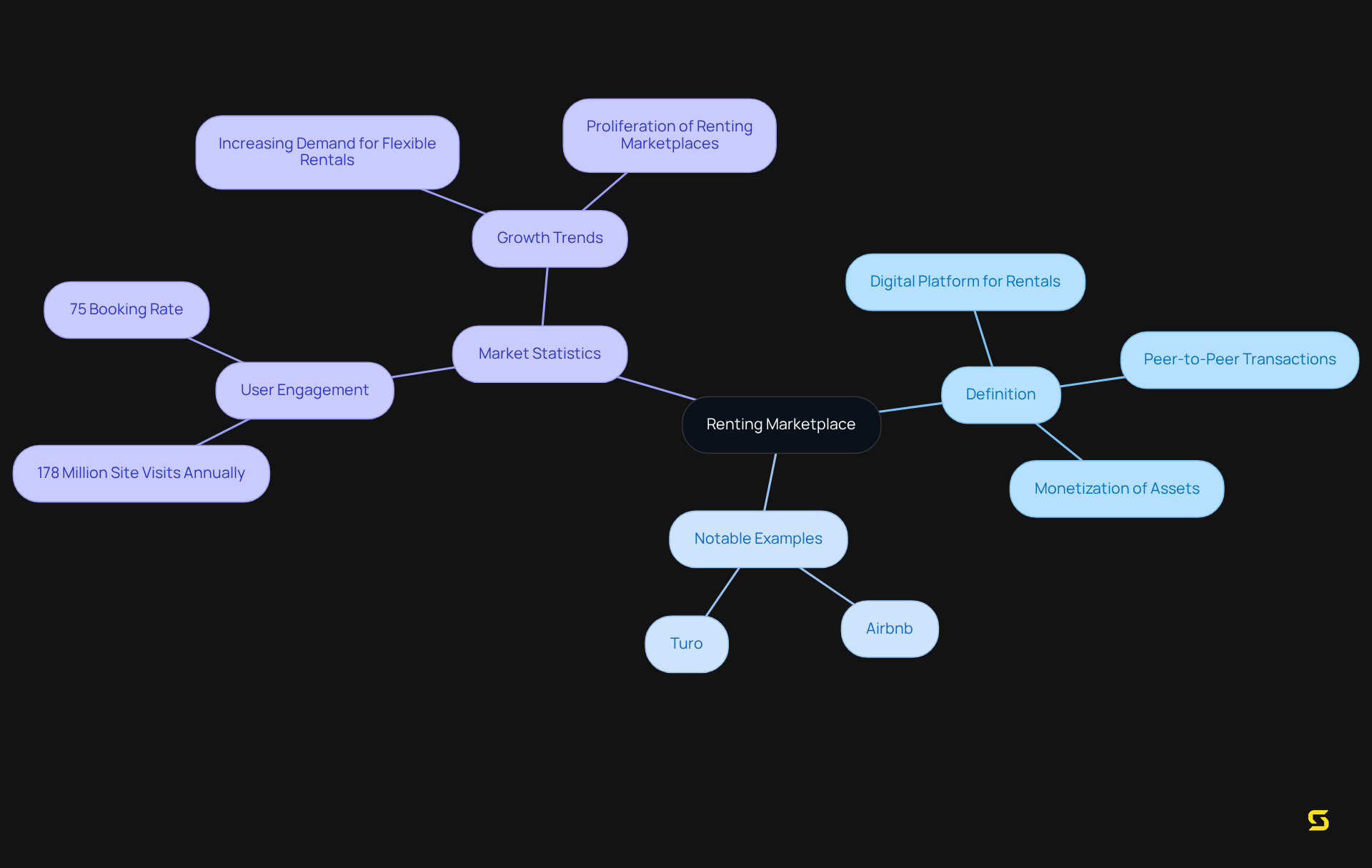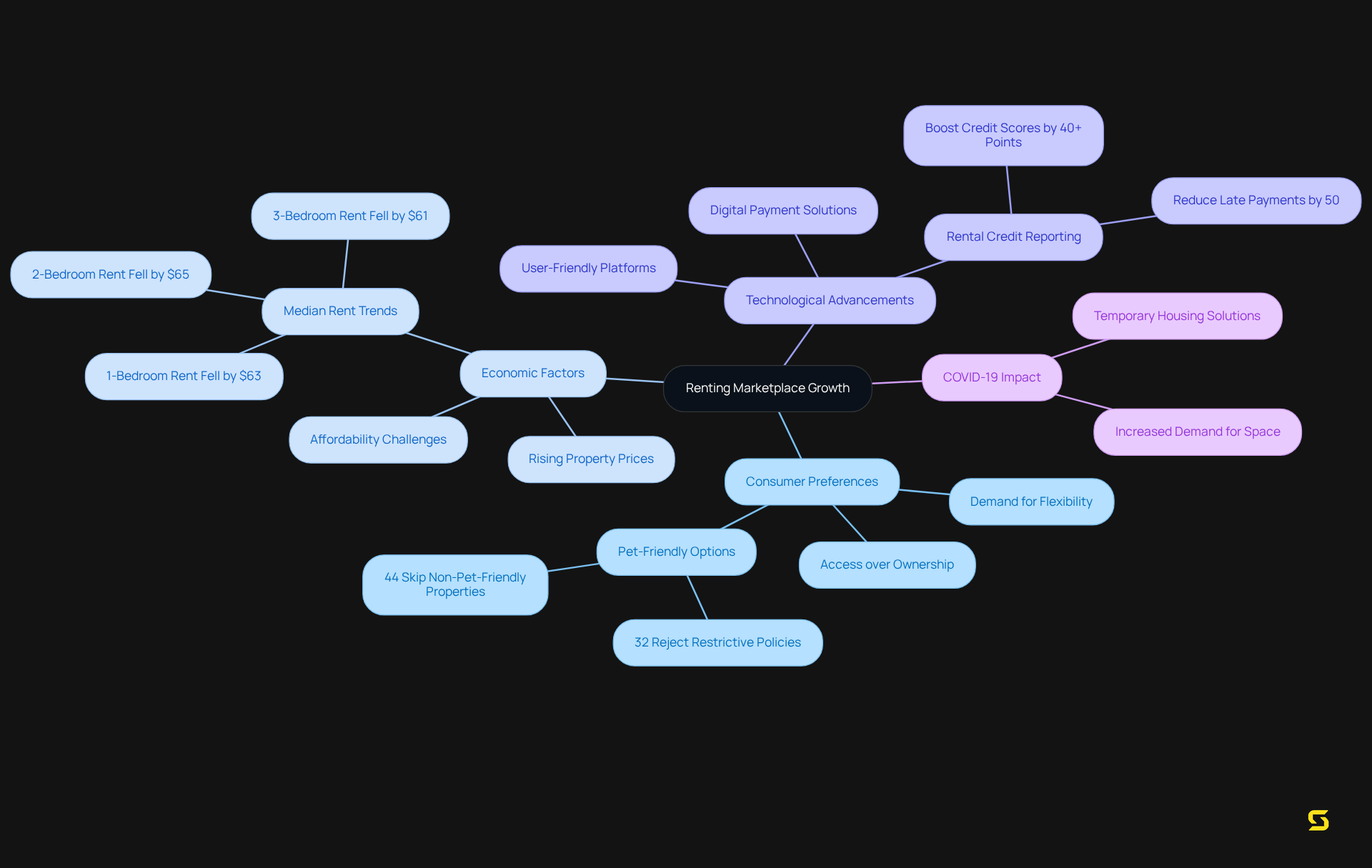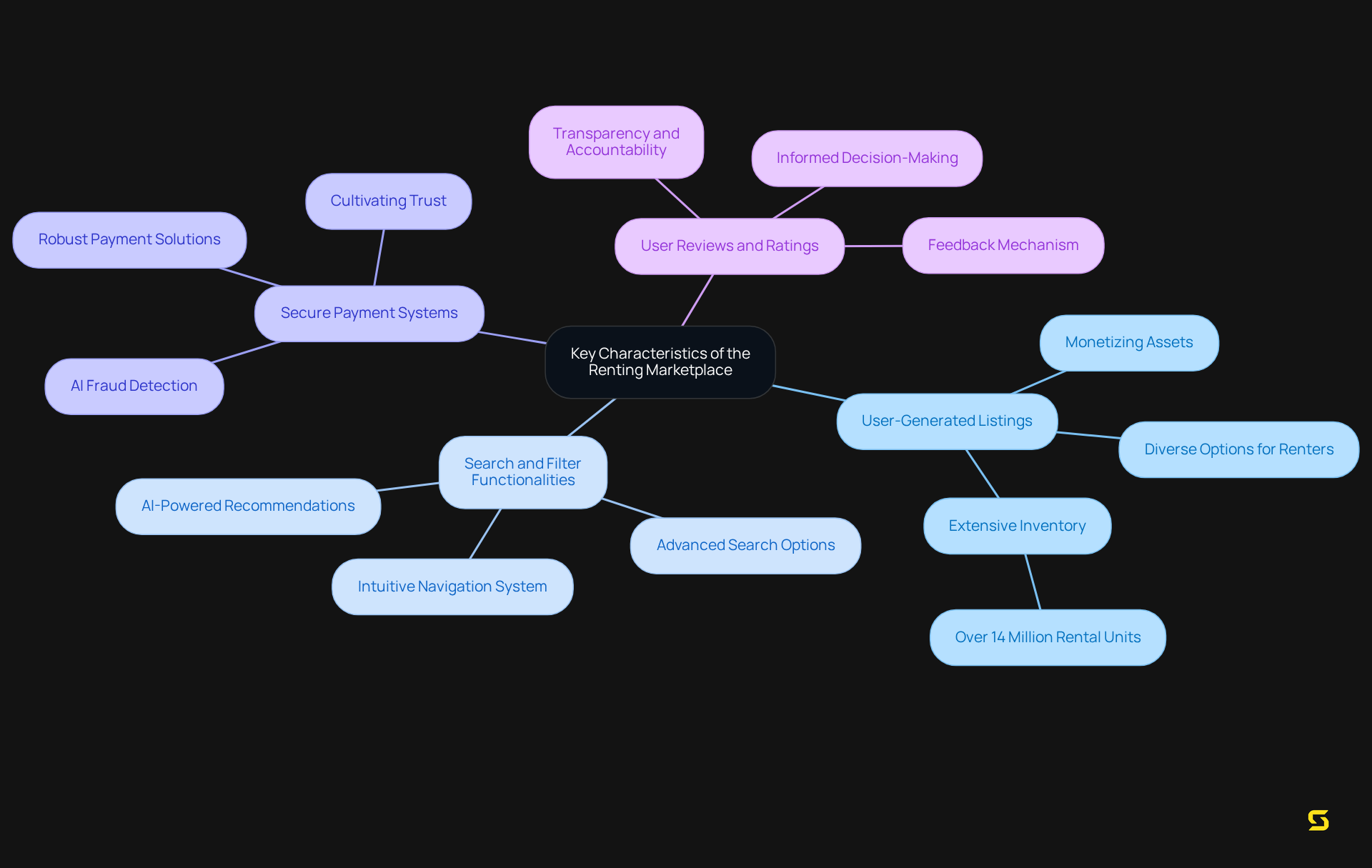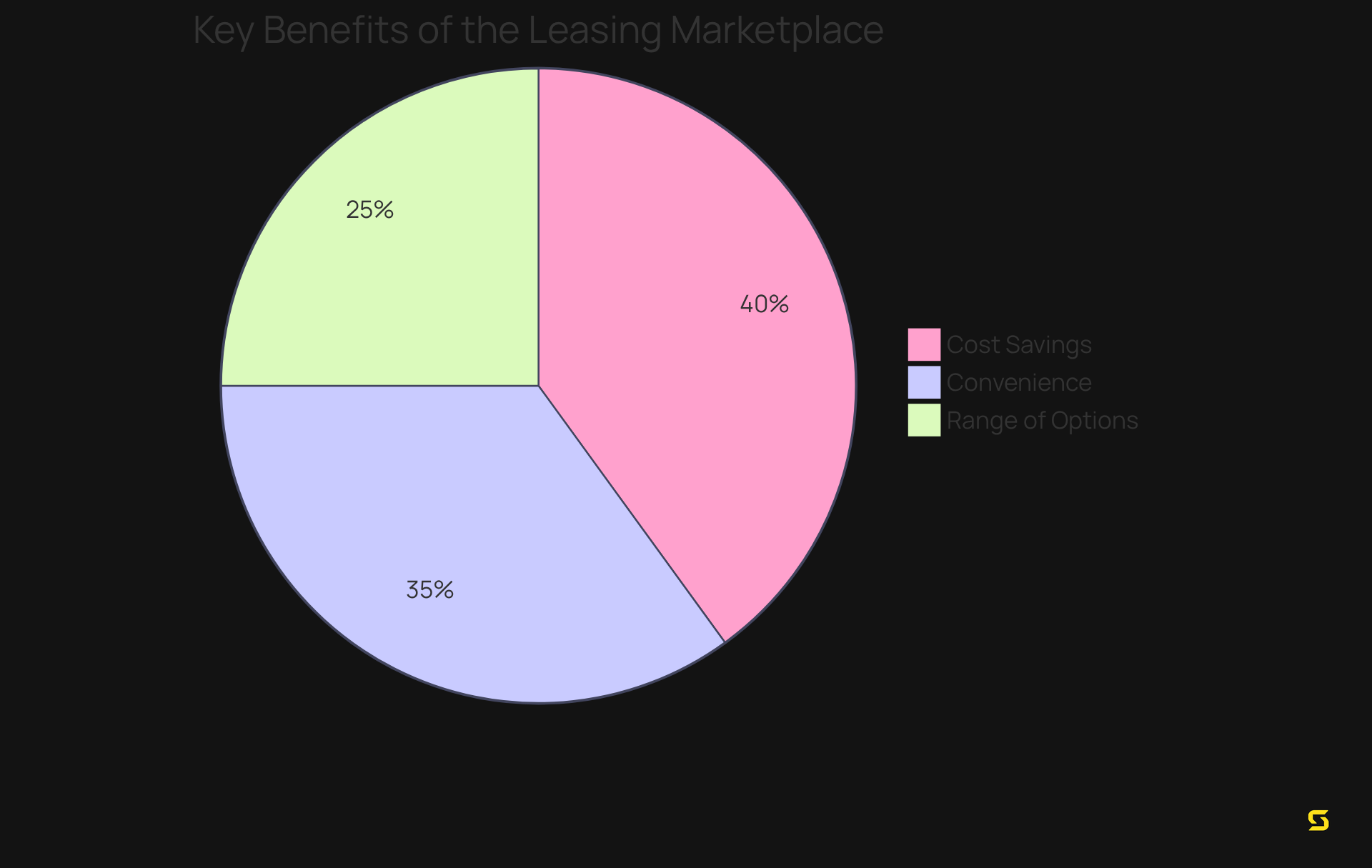Overview
The renting marketplace represents a pivotal digital platform that facilitates direct rentals between individuals or businesses. This innovative system empowers users to list and discover a diverse range of assets, from real estate to equipment. Notably, platforms like Airbnb and Turo exemplify the marketplace's significance, showcasing its transformative impact on consumer behavior.
The remarkable growth of this sector is driven by:
- Evolving consumer preferences
- Economic factors
- Technological advancements that significantly enhance user experience and foster trust in transactions
As we navigate this dynamic landscape, it is crucial to recognize the implications of these changes and the opportunities they present.
Introduction
The renting marketplace has emerged as a transformative force in how individuals and businesses access goods and services, shifting the focus from ownership to flexibility. This digital ecosystem not only enables users to monetize their assets but also provides renters with a diverse selection of options, catering to the growing demand for accessible leasing solutions. As this innovative model gains traction, questions arise about its long-term sustainability and the implications for traditional ownership paradigms. What does this mean for consumers and businesses alike in an ever-evolving economic landscape?
Define the Renting Marketplace
A renting marketplace acts as a robust digital platform that enables direct rentals of different items or properties between individuals or businesses. By acting as an intermediary, these renting marketplace platforms empower users to list, discover, and rent assets—ranging from real estate to equipment—thereby fostering efficient peer-to-peer transactions. This innovative renting marketplace not only enables users to monetize their assets but also offers renters a diverse array of options, all without the burdens associated with ownership.
Notable examples include:
- Airbnb, which excels in short-term lodgings
- Turo, which focuses on vehicle rentals
As we approach 2025, the proliferation of the renting marketplace continues to rise, underscoring the growing demand for flexible leasing solutions in our dynamic economy. Zumper, recognized as the in North America, reports over 178 million site visits annually, with an impressive 75% of users booking one to two rentals each month. This data underscores the significant engagement and interest in the renting marketplace, highlighting its critical role in addressing the ongoing affordability crisis faced by many tenants.

Contextualize the Renting Marketplace
The renting marketplace has witnessed remarkable growth in recent years, primarily driven by a notable shift in consumer preferences that increasingly favor access over ownership. Economic factors, particularly rising property prices and an escalating demand for flexibility, have rendered leasing an attractive option for numerous individuals. The COVID-19 pandemic has further catalyzed this trend, as people actively sought temporary housing solutions and services that resonate with their evolving lifestyles. Moreover, technological advancements have facilitated the emergence of user-friendly platforms in the renting marketplace that streamline the leasing process, fostering seamless connections and transactions among users. This evolving landscape underscores the pivotal role of the renting marketplace in providing amid ongoing economic fluctuations.

Explore Key Characteristics of the Renting Marketplace
The renting marketplace is characterized by several key features that significantly enhance its functionality and appeal. User-generated listings serve as a cornerstone of the , allowing individuals to monetize their assets while offering renters a diverse array of options. This democratization of listings fosters a vibrant renting marketplace where unique items and properties can be discovered to meet various needs. For instance, Dwellsy, a leading rental marketplace, showcases an extensive inventory of over 14 million rental units, illustrating the vast selection available to users. Furthermore, advanced search and filter functionalities improve the renting marketplace experience, enabling renters to navigate efficiently through options and pinpoint precisely what they seek.
In the renting marketplace, secure payment systems are paramount, ensuring safe transactions that cultivate trust between renters and property owners. By implementing robust payment solutions, including AI-driven fraud detection systems, platforms can effectively mitigate risks associated with online transactions, thereby bolstering consumer confidence. Additionally, user reviews and ratings play a crucial role in fostering transparency and accountability in the renting marketplace. They empower tenants to make informed decisions based on the experiences of others, which is particularly vital in an environment where trust is indispensable. As articulated by Jonas Bordo, CEO of Dwellsy, the demand for a quality housing platform that provides high-quality listings and accurate pricing information is substantial.
Collectively, these characteristics not only enhance the functionality of the renting marketplace but also establish it as a trustworthy option for both tenants and property owners. As the rental landscape continues to evolve, the integration of these elements will further shape the future of the renting marketplace, making it increasingly appealing to users who seek secure and efficient rental experiences.

Highlight Benefits of the Renting Marketplace
The leasing marketplace offers , including cost savings, convenience, and an extensive range of options. For consumers, leasing is often more affordable than purchasing, particularly for high-cost items like vehicles or vacation homes. The convenience of online platforms empowers users to browse and book rentals from virtually anywhere, thereby saving valuable time and effort. Furthermore, leasing provides access to products and services that may be impractical to own, such as specialized equipment or luxury accommodations. For businesses, engaging in a renting marketplace can enhance revenue streams and improve customer engagement, establishing a mutually beneficial model for all parties involved. Embrace the opportunities within the leasing marketplace today and experience the advantages firsthand.

Conclusion
The renting marketplace signifies a transformative shift in how individuals and businesses access goods and services, placing a premium on flexibility and affordability over traditional ownership. This innovative platform is evolving continuously, playing a crucial role in meeting the needs of modern consumers who prioritize convenience and diverse options without the burdens associated with full ownership.
Key insights reveal the remarkable growth of the renting marketplace, propelled by shifting consumer preferences and economic factors, notably rising property prices. Platforms such as Airbnb and Turo exemplify the diverse applications within this marketplace, while user-generated listings and secure payment systems enhance trust and functionality. The advantages of renting, including significant cost savings and unparalleled convenience, further reinforce the relevance of this model in today’s economy.
Ultimately, embracing the renting marketplace not only unlocks a world of opportunities for consumers and businesses alike but also promotes a more sustainable approach to resource utilization. As this landscape continues to evolve, engaging with the renting marketplace can lead to enhanced experiences and a more adaptable lifestyle, encouraging individuals to explore the vast potential that renting offers in an ever-changing world.
Frequently Asked Questions
What is a renting marketplace?
A renting marketplace is a digital platform that facilitates direct rentals of various items or properties between individuals or businesses, enabling users to list, discover, and rent assets efficiently.
What types of assets can be rented through a renting marketplace?
Users can rent a wide range of assets, including real estate and equipment.
How do renting marketplaces benefit users?
Renting marketplaces allow users to monetize their assets while offering renters diverse options without the burdens associated with ownership.
Can you provide examples of notable renting marketplaces?
Notable examples include Airbnb, which specializes in short-term lodging, and Turo, which focuses on vehicle rentals.
What is the trend regarding renting marketplaces as we approach 2025?
The renting marketplace is expected to continue rising in popularity, reflecting the growing demand for flexible leasing solutions in the economy.
What does Zumper report about user engagement in the renting marketplace?
Zumper, the largest privately owned rental platform in North America, reports over 178 million site visits annually, with 75% of users booking one to two rentals each month, indicating significant interest in the renting marketplace.
How does the renting marketplace address the affordability crisis?
The renting marketplace plays a critical role in addressing the ongoing affordability crisis faced by many tenants by providing flexible rental options.





